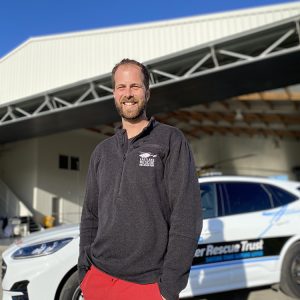Funding for a new vehicle makes the Trust Tairāwhiti Eastland Rescue Helicopter service better able to serve its community, says Eastland Helicopter Rescue Trust (EHRT) treasurer Ian Parker.
“We have an obligation to provide three vehicles to ensure that any team members not on site can get to our hangar within minutes,” he says.
“But while the pilots’ ute and crew car are still serviceable, the paramedics’ vehicle was coming to the end of its life.
“This generous grant from Kiwi Gaming Foundation has allowed us not only to replace this vehicle, but also to ensure it is equipped for high-quality land-based critical care.”
The grant of $45,000 covers the purchase and fit-out of the Ford Escape SUV, backing from EHRT supporter Gisborne Motors ensuring a sharp pencil was run over pricing and subsequent servicing.
The SUV – which arrived this month – will be used by the team of four critical care flight paramedics including base manager Richard Curtis, who is stoked to have a vehicle more suited to the region’s sometimes tricky roads.
While the rescue helicopter can often be spotted heading to locations far from its Gisborne Airport base, the vehicle will help the team offer support during land-based call-outs closer to home.
“Because we have a critical care flight paramedic on duty 24/7, there are times their special skills are required even when the helicopter is not in action,” says Mr Parker.
To keep the rescue helicopter in the air EHRT has to raise well in excess of $300,000 annually – in addition to substantial support from Trust Tairāwhiti – and chair Patrick Willock says input like that from the Kiwi Gaming grant is critical to hitting the mark.
“It is a big ask for a community like ours that is certainly not the most wealthy in New Zealand,” he says.
“We are grateful for the incredibly generous backing we receive but are also mindful of the many other local organisations needing support. So we try not to dominate the fundraising space and that’s where grants like these can make all the difference.”
Also approved, in May, was a $12,000 New Zealand Community Trust grant to buy two new Alpha Eagle Dual Flight Helmets.
To ensure they are not sent off-kilter by heavy night-vision goggles the $6000 helmets are custom-fitted for each team member and incorporate visors, communications, and a noise-cancelling feature to prevent pilot fatigue.
Though they can be repurposed for new crew, they cannot safely be used beyond their lifespan of about 10 years.
“These helmets are standard across all Search and Rescue Service (SRSL) bases and we need to have top-spec equipment so our team can operate at its best,” says Ian Parker.
“Their purchase is an ongoing expense for EHRT so this support from the Community Trust is a big help in ensuring te Tairāwhiti is served by a helicopter rescue service at the top of its game.”
CRITICAL GEAR FOR CRITICAL CARE: Hands-free communication and GPS technology in the new Ford Escape SUV means Trust Tairāwhiti Eastland Rescue Helicopter critical care flight paramedics, including base manager Richard Curtis (pictured), will be able to focus on the job when attending land-based call-outs.
